 SOCIOVATION
SOCIOVATION
ThinkPhi’s flagship product called Ulta Chaata converts rain water into potable drinking water during monsoons, and produces energy with the help of solar panels in the dry seasons.
One unit of Ulta Chaata can collect 8-10 lakh quintal of water annually and capture energy with maximum peak power of 1.5 Kw. It is currently being used at over 50 locations across the country.
Ulta Chaata, Hindi for inverted umbrella, is a device that looks exactly like it is named. During monsoons, Ulta Chaata’s concave canopy captures rain water, which then trickles down to reach a filter. The water is filtered using active carbon filtration – a method that uses a bed of activated carbon to remove impurities. The filter reduces the turbidity of water flowing through it, thereby making it potable.
A cluster of 15 Chaatas are connected to a Phi box with another fine filtration layer to remove bacteria, after which the water becomes usable.
The Chaatas cost between Rs. 4.5 and 5 lakh and are warrantied for 10 years. But according to ThinkPhi, the amount of water and energy generated helps users get their returns in about a year.The Phi box has sensors for the Chaata clusters to interact with the company and the users. The first one is to detect whenever the filter is about to clog due to dust and dirt and needs cleaning. It sends a message to ThinkPhi informing which device needs servicing.
The second sensor is meant to calculate the amount of energy and water collected. This further helps bring about behavioural change among people by showing them inspiring numbers. The other sensors measure water purity and also inform the company in case the lights on any of the Chaatas are out. Additionally, users can interact with ThinkPhi about using an app on their phones to register complaints, ask questions in case of any problems, etc.
Ulta Chaata is being used on campuses of large organizations in Bombay and Pune. The company is gearing up to set up devices in Gujarat and Bangalore too.
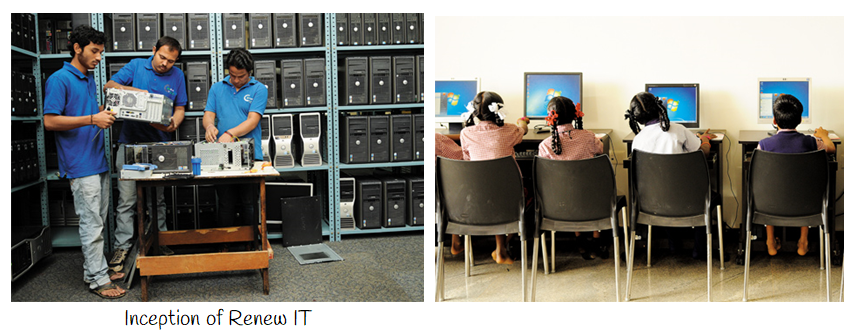
A graduate in Electronics Engineering from REC Surat, Mukund B.S has done his Post-Graduation in management studies from the Indian Institute of Management, Calcutta. Mukund worked in the Marketing team of Aashirvaad in ITC Foods, and was a part of the core team being instrumental in Aashirvaad Atta becoming the undisputed market leader in most geographies across the country. During his stint at ITC, he was inspired by the “Triple Bottom Line” philosophy and was keen to start off a venture which could create a Triple Bottom Line impact.
Mukund is also the Secretary-Treasurer of the IIM-Calcutta Alumni – Bangalore chapter and actively manages the Alumni e-group. Apart from this, Mukund is actively involved with social causes and works very closely with AMBA CEEIC, an organization established to holistically empower the intellectually challenged community through Economic Empowerment. He is keen to enhance learning through technology in education to bridge the digital divide in rural schools.
Raghav is a graduate from Western Michigan University and MBA from Manchester Business School. Equipped with the foreign exposure, Raghav wanted to build a successful business in India. He returned to India and successfully grew a pharmaceutical CMO for a couple of years.
During his stint, when he was upgrading his IT infrastructure, he saw that the way the computers were being disposed could be vastly improved and ended up co-founding ReNew-IT with Mukund.
Raghav is a keen Networker. He is the founding member and has been on the leadership role of BNI – Ultimate Chapter. He actively mentors and contributes to the growth of the entrepreneurs of the Chapter. In this exclusive conversation with Life Beyond Numbers, Mukund shares his journey with ReNew IT, their mission, challenges they faced, their learning and much more…
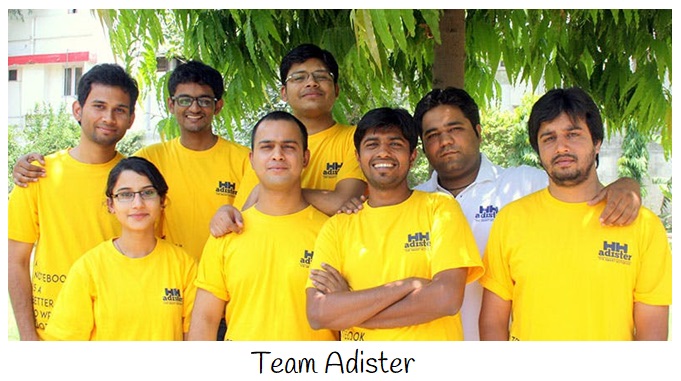
India has a huge potential as a market. With over 60% of the population under the age of 25 years, a big part of our population is still in schools and colleges. Access to education is one part but giving them cheap stationary is often another neglected part of the equation. To solve this problem, Shubham Aggarwal and Anubhav Goyal started Adister during their stay at IIT Roorkee. Here is what we wrote about them earlier.
They bring the cost of notebooks down by placing advertisements on them. They have managed to bring the costs down by 50% and in some cases over 50%; and it is still a profitable model. Shubham Aggarwal, Co-founder of Adister, said, "In our first edition, we could have given Rs.3 with every free notebook and we would have still earned a profit." When they started, they had to face a lot of challenges, but they had their own ways of navigating through them. Shubham talks to us about some of those challenges.
"In the earlier days, the quotation for notebook manufacturing was very high and we thought of going to where the paper mills were located to get better quotes. It worked, and we were able to get much better prices. The other challenge was people did not take us seriously, so we pretended that we were just young recruits who had a ‘big boss’ in the office! Yet another challenge was telling parents about this. We never told them until we got DISCO(Disciplinary committee) threatening notice from DOSW (Dean Of Students Welfare). Later we told them that it’s a “project”."
Initially funded by B Plan competitions, Adister got seed funding from Mrs. Nupur Panjabi in July 2013 to start their operations. They are also raising money via crowd funding for the current edition of the notebook which is priced at Rs.18, while other notebooks of the same type (125 pages, spiral bind) come for around Rs. 30 to Rs. 50 in the market. Initially, they gave the first version of the notebooks for free.
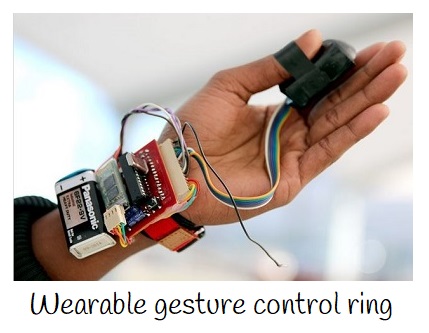
Rohildev.N has created a gesture control ring that uses interactions between the thumb and fingers to manage smart devices.
Different thumb and finger combinations can be used to control different devices through a Bluetooth connection. As the internet of things becomes more prevalent in our lives Fin is another option we will have for eliminating remote controls.
When Fin is being used screens are one hundred percent visible, and when security is a concern Fin can control devices discreetly from inside a pocket or jacket. When driving a user can control automotive devices or smartphones without taking their eyes off of the road.
Operations work through an optical sensor in the ring. Fin detects the swipes and taps across your hand and sends the signals to a devices that takes in the output signal. Future plans call for biometrics to delineate between different parts of the finger, adding more controls to the mix.
Rohildev and his company, RHL Vision, were showcased at the TechCrunch Hardware Battlefield at the 2014 Consumer Electronics Show. Fin was successfully crowdfunded through indiegogo in early 2014 and preorders are being taken through the website at a $120 price.
The indiegogo video and website video share a lot of footage, and the examples come rapid fire. Joggers, drivers, gamers and head mounted device users are all shown using the Fin. Giving a presentation is shown with the Fin acting as the remote control, and the uses for physically challenged people are explored.
The Fin device is amazing, and the company looks to be full of engineers, makers and entrepreneurs who will bring the company's products to market. Based in Karala, India the company also operates out of Fin Robotics Inc in Palo Alto, California. The website doesn't have an official release date beyond "coming soon" but September 2014 is the date given on the indiegogo page for production of the first units.
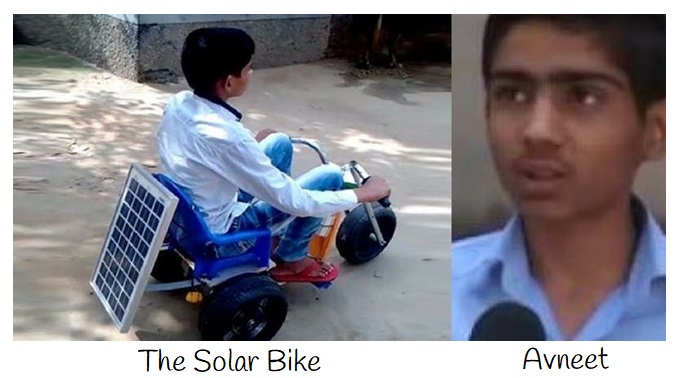
This 13-year-old from Haryana has proved that age is just a number by building a solar bike. While the country is struggling with ever-increasing air pollution and the Supreme Court has laid guidelines for its prevention, Avneet has designed a fully-functional solar bike that works entirely on solar energy.
With the multitude of problems originating due to air pollution, the time has come to forego conventional sources of energy such as fuel and move towards renewable sources of energy. The renewable solar energy is being touted as the alternative source. Many scientists and researchers are working towards utilising solar energy to the maximum, and many of them have also been successful.
The solar bike designed by this young boy runs at 20 kilometres per hour. Avneet reiterates the eco-friendly aspect of the solar bike as it does not emit smoke, and, therefore, will not cause pollution. This emission-free innovation can give a tough competition to battery-driven vehicles.
Avneet used a bicycle for kids to build this solar bike by installing a solar panel on it which derives power to push the bike forward. In its nascent stage at present, the bike is a one-seater. However, as it utilises solar energy, it will also prove to be economical as one will not have to spend on fuel such as petrol on a regular basis.
Avneet dreams to build a solar car in the future, which he believes will be less expensive when compared to even a Tata Nano car. Meanwhile, it is said that scientists have also developed a bike which runs on solar energy and will soon be available in the markets.
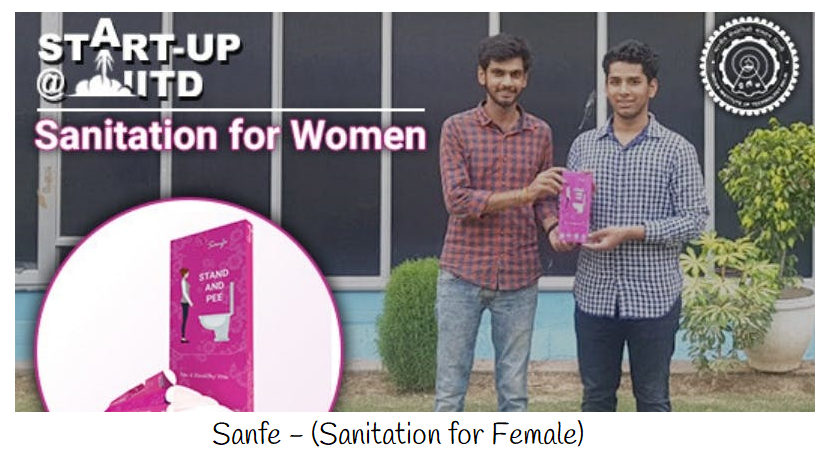
Sanitation has always been a prime concern in India. According to a report by WaterAid, 732 million people in India do not have access to basic sanitation. In urban India despite having public toilets facility, a whopping 71 percent of the public washrooms are unusable. The worst affected, as one can imagine, are the women, especially those who travel a lot. To get a clearer picture, check out these statistics: 62 percent of pregnant women find it painful to urinate in a semi-squat position, 50 percent suffer from UTIs (urinary tract infections) and 48 percent hold their urine to avoid using public restrooms.
To mitigate UTIs arising out of using public washrooms, Sanfe (Sanitation for Female) has come up with a product, that allows women to use the loo without sitting on it. Sanfe is a startup that was founded by Archit Agarwal and Harry Sherawat, both third-year textile engineering students at IIT-Delhi.
The equipment costs only Rs 10 and is available at all pharmacies in AIIMS, Apollo Hospital. The duo has also filed a patent for their equipment, which they claim is biodegradable and easy to dispose of. The design of the product remained an issue as neither knew what could be used by all women. To address the dilemma they approached Prof Srinivasan Venkatraman at the Dept of Design, IIT-Delhi.
It is compact enough to be carried in a purse and can be disposed of easily after one use. Among various other advantages, the surface area of the apparatus has smooth curves to avoid paper cuts. As the product was ready, the duo asked their friends and others to use and give them feedback on which the design in the future will be altered. The duo are now getting orders and looking at getting their product out beyond Delhi.